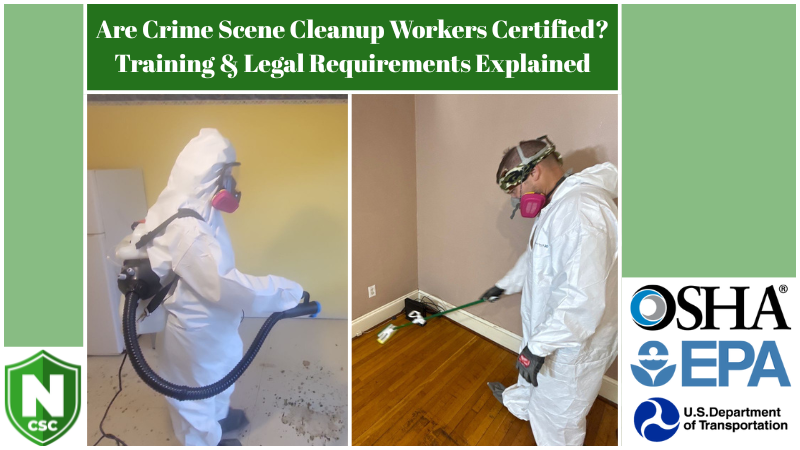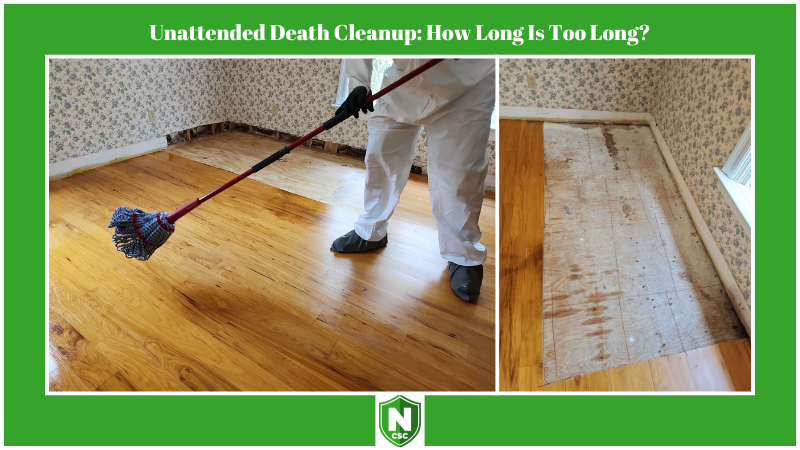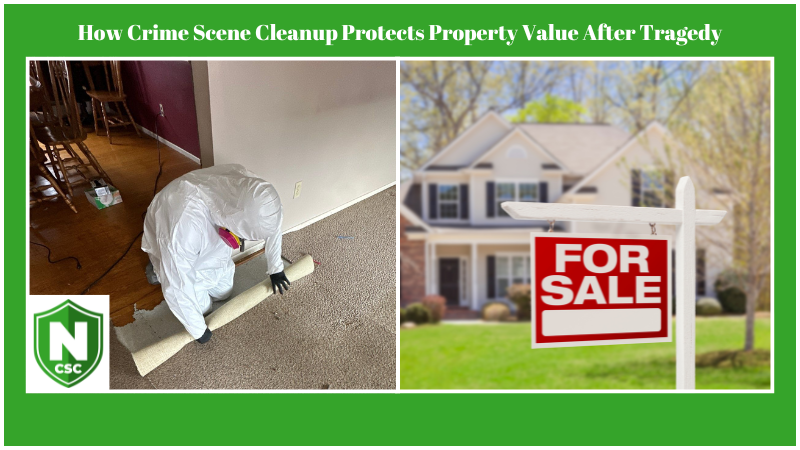Are Crime Scene Cleanup Workers Certified? Training & Legal Requirements Explained

When the unimaginable happens and a violent incident or traumatic event occurs, professional crime scene cleanup becomes essential. But many people ask, “Are crime scene cleanup workers certified?” The answer is more complex than a simple yes or no. In this post, we’ll explore the certifications, training, and legal requirements involved in becoming a crime scene cleanup professional — including OSHA requirements, biohazard cleaning licenses, and more.
What Is Crime Scene Cleanup?
Crime scene cleanup — also called biohazard remediation — involves the safe and thorough removal of blood, bodily fluids, tissue, and other hazardous materials left behind after suicides, homicides, unattended deaths, and other trauma scenes.
This work requires strict compliance with federal, state, and local laws governing biohazard waste handling, transport, and disposal.
👉 Related: What Is Crime Scene Cleanup?
Do You Need a Certification to Clean Crime Scenes?
Technically, there is no federal crime scene cleanup certification that is universally required. However, crime scene cleanup workers must comply with numerous safety regulations and obtain certifications and training in relevant areas to legally and safely perform the job.
The main certifications typically include:
1. OSHA Bloodborne Pathogens Standard (29 CFR 1910.1030)
This is the minimum required training for any employee exposed to blood or potentially infectious materials.
- Covers how to prevent exposure to bloodborne diseases like HIV, Hepatitis B, and Hepatitis C.
- Required annually by OSHA.
✅ Learn more from OSHA.gov
2. Hazard Communication (HazCom) Training
HazCom training ensures workers understand the risks of chemical cleaning agents used during decontamination.
- Includes labeling, safety data sheets (SDS), and proper PPE usage.
3. Respiratory Protection & PPE Training
Crime scene cleanup often requires respirators and full protective gear. OSHA mandates training under 29 CFR 1910.134 to ensure workers:
- Know how to select, wear, and maintain respirators
- Can pass fit tests
4. Biohazard Waste Disposal Training
Proper disposal of medical and biohazard waste is regulated by both state and federal laws. Workers must:
- Understand local requirements
- Use certified waste transporters
- Follow labeling and container protocols
🧪 CDC Guidelines on Waste Management
Is a License Required to Perform Biohazard Cleaning?
Whether a biohazard cleaning license is required depends on your state or locality.
Some states like California and Florida have specific licensing requirements for trauma scene waste management practitioners. These may include:
- Background checks
- Proof of training and experience
- Registration with the state health department
- Proof of proper insurance and bonding
📍 For example:
In California, you must register as a Trauma Scene Waste Management Practitioner with the California Department of Public Health (CDPH).
More at: CDPH Guidelines
Additional Voluntary Certifications
While not legally required, many reputable companies and professionals pursue additional certifications to enhance their credentials and ensure top-tier service:
• ABRA Certification (American Bio-Recovery Association)
ABRA offers a Certified Bio-Recovery Technician (CBRT) credential for crime scene and trauma cleanup professionals.
- Verifies technical competence
- Shows adherence to industry best practices
• IICRC Certification
Some crime scene cleanup companies also pursue certifications through the Institute of Inspection Cleaning and Restoration Certification (IICRC), especially in:
- Trauma & Crime Scene Cleanup (TCST)
- Odor Control (OCT)
Employer Responsibility: Legal & Ethical Compliance
If you’re a company providing crime scene cleanup, you’re legally obligated to:
- Comply with all OSHA requirements for cleanup
- Maintain documentation of worker training
- Provide Hepatitis B vaccinations
- Implement an exposure control plan
- Carry general liability and pollution insurance
🔐 Tip: Always ask your crime scene cleanup company to show proof of their training, insurance, and compliance.
Why Proper Training Matters
Crime and trauma scene cleaning is not just a janitorial task — it’s a high-risk profession involving:
- Biological exposure
- Mental health stress
- Legal consequences of improper handling
Professionals who are not properly trained can:
- Endanger themselves and others
- Spread contaminants
- Face fines or lawsuits
How to Choose a Certified Crime Scene Cleanup Company
When hiring a crime scene or biohazard remediation company, consider the following red flags and credentials:
✅ Look For:
- OSHA-compliant training certifications
- Biohazard insurance and bonding
- State licensing (if applicable)
- 24/7 emergency response
- Transparent waste handling policies
🚩 Avoid:
- Companies with no website or contact info
- Services that won’t provide proof of training
- Lowest bids that seem too good to be true
👉 Explore Our Services: Crime Scene Cleanup Near You
Final Thoughts
While there isn’t a single national “crime scene cleanup certification,” professionals in this field must undergo extensive training to meet OSHA, state, and industry standards. Proper certification ensures safety, compliance, and peace of mind for families, businesses, and property owners in the aftermath of trauma.
If you’re in need of professional, certified crime scene cleanup services, contact us today. Our team is available 24/7, trained, licensed, and ready to help.



